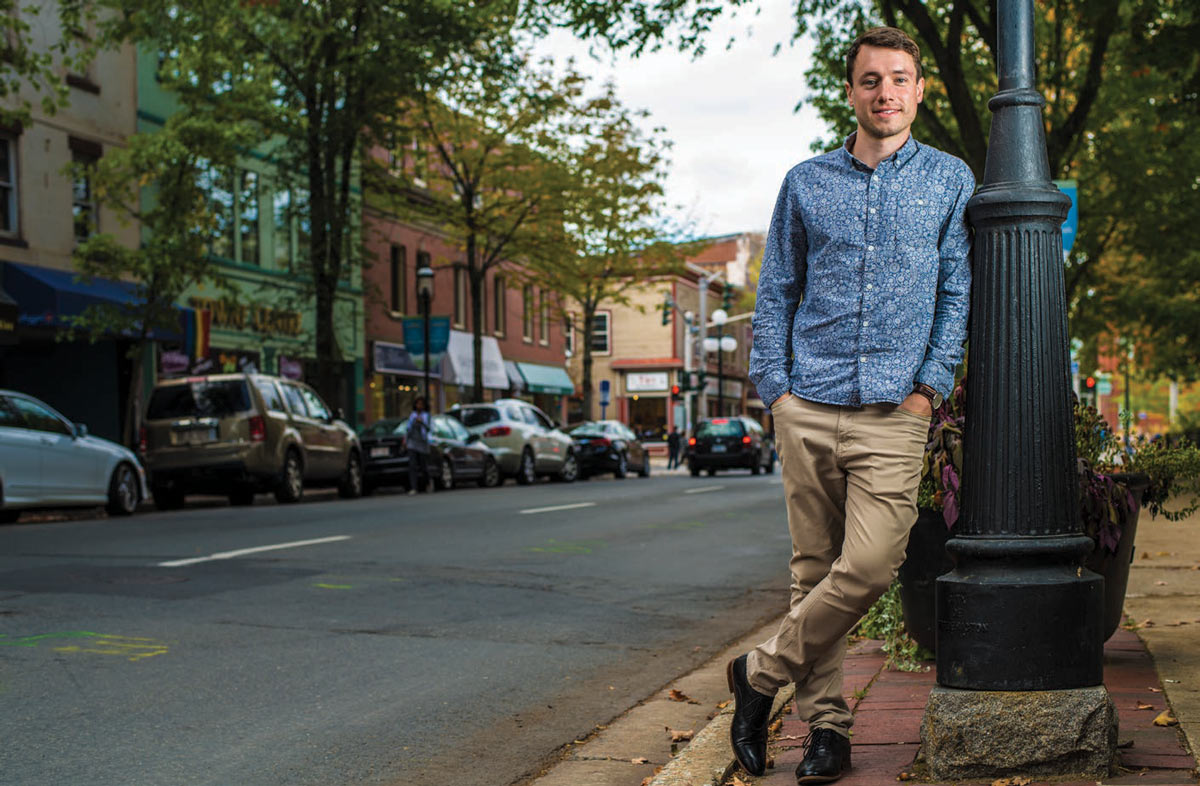
David Brown chose to establish his business in his hometown of Fredericton, NB, which he describes as a great place to start and grow a company.
Sometimes all it takes is one pivotal class to shift a student's perspective and set them on a path they would otherwise never have considered.
Indeed, if not for a single course, David Brown ('13 BSc) may never have found his way to becoming a successful biochemist, entrepreneur, business owner, and national award winner-all before his 30th birthday.
Originally from New Brunswick, Brown chose to study at the University of Alberta after visiting as a high school student to compete in a track and field competition. He liked the campus and remembered the U of A later when considering options for a postsecondary science program.
Like many students, he couldn't decide at first where he wanted his degree to take him. "I volunteered at a veterinary clinic, I studied to write the entrance exam for pharmacy, I kind of considered the MCAT, and then I thought about grad school… so I had no idea," he says with a laugh.
It wasn't until his final year that something finally clicked. "There was one course-Industrial Microbiology, taught by Dr. Julia Foght-that I just found so interesting. I knew after that course I wanted to work in the business side of science."
The course, MICRB 315, was designed by Foght with support funding from the Teaching and Learning Enhancement Fund. Aiming for broad accessibility across disciplines, Foght's goal with MICRB 315 was to demonstrate microbiology as a practical tool integral to industrial processes ranging from food, beverage, and pharmaceutical production to green energy generation and municipal waste management.
"[MICRB 315] was relevant to students' everyday lives and interesting to people other than their classmates-that's education that propagates beyond the classroom and helps to foster scientific literacy in the wider community," says Foght, now a professor emerita.
The course incorporates several entrepreneurial assignments that require students to envision and research novel virtual but feasible biotechnology products, then "pitch" the ideas to their classmates. "The exercise demanded a type of creative intelligence different from rote learning or logical deduction. It was daunting to some, but caught the imagination of more," she explains. "David Brown was one that 'got it' and made the most of the challenge."
Birth of a business
One lecture featured engineering professor Dominic Sauvageau, who was invited to talk to the class about iGEM (International Genetically Engineered Machine), an international synthetic biology competition held annually by MIT that draws teams from universities across the world.
Intrigued by the opportunity, Brown joined the U of A team of eight students, supervised by Sauvageau, who together engineered a bacterium that would consume paper waste from recycling and in turn produce chemicals used in the perfume and cosmetics industries.
"The teacher's reward becomes the success of the student, and we get back in satisfaction what we invest in time and energy." -Julia Foght
Since it was entered in the entrepreneurial division, the project also required the team to put together a business case and pitch to accompany the science. "It felt like a startup," says Brown. "I learned a lot from the six months that we were working on it."
The U of A team ultimately beat out all other competitors to win the division, and the experience reaffirmed Brown's interest in pursuing a career in business. So, when his initial job prospect after graduation fell through, he knew it was time to take the plunge. Thus, his first company-Mycodev Group-was born.
The idea for the company involved using a novel process of fungal fermentation to produce chitosan, a versatile pharmaceutical ingredient with widespread applications in cancer therapy, wound care, medical devices, and genetic therapies. Although chitosan is already used in many applications today, there are challenges associated with obtaining the ingredient, which has until now been predominantly sourced from the shells of crab and shrimp.
"There are a lot of problems with that supply," explains Brown. "Not only is the purity typically bad, but the source raises some issues because of potential shellfish allergens, and there are certain cultural reasons that people wouldn't be able to use pharmaceuticals that were derived from shellfish."
By obtaining chitosan from fungus instead of shellfish, Mycodev was also able to produce a more reliable, sustainable, and higher-purity chitosan. It was a hit, and the company had immediate interest from medical device companies in the United States.
Hometown homebase
To help with the administrative side of the business, Brown recruited a partner to act as CEO a few months after launching Mycodev. Three years later, the two of them started an offshoot company, Chinova Bioworks, which uses mushroom chitosan as a preservative for foods, beverages, and cosmetics. Together, Mycodev and Chinova now employ more than 10 people-with the goal of growing into a hundred-million-dollar company within 10 years.
"I think most science students are kind of stuck on following a traditional career path, such as going to medical school or doing graduate degrees, but there are so many opportunities in entrepreneurship, and it's really not that hard if it's something that you love doing." -David Brown
Both Mycodev and Chinova are based in Brown's hometown of Fredericton, New Brunswick. Though he initially expected to end up in a bigger centre such as Edmonton or Toronto, Brown quickly saw the advantages in being the proverbial bigger fish. "New Brunswick is a great place to start and grow a company," he says. "It's hard to get attention in a big province like Alberta or B.C. or Ontario-you really have to do a lot of work to get anyone to notice you. Sometimes it pays to be in a smaller province."
And Brown has already been noticed in a big way. Earlier this year, he won a Governor General's Innovation (GGI) Award in recognition of his achievements. According to the award's website, "These awards recognize and celebrate outstanding Canadian individuals, teams and organizations whose exceptional and transformative work help shape our future and positively impact our quality of life."
Says Brown, "It was a big surprise. I was just very honoured and humbled by it."
Maintaining mentorship
Along with the support he's received from Futurepreneur-a Canadian organization for youth entrepreneurs and the nominator for Brown's GGI award-Brown still credits that one transformational course-Industrial Biology-with setting him on the path to where he is today. He still keeps in touch with Foght. "I still actually go to her for a lot of advice- she's a big expert in fermentation and fermentation technologies, so still if I have any questions, she's one of the first people I'll email."
Though no longer actively teaching, Foght is pleased to continue providing support to her former pupils. She sees her role as akin to striking sparks amongst kindling-the students' intelligence and engagement-then encouraging a sustained flame through gentle breaths of encouragement, even if it extends beyond the classroom and formal contact hours.
"The teacher's reward becomes the success of the student, and we get back in satisfaction what we invest in time and energy," she explains. "I am delighted to have contributed in a small way to David's choice of career and subsequent successes, and I count his most recent achievement of the Governor General's award as a teacher's bonus. With David's permission, I told subsequent classes about the Mycodev startup company to illustrate that entrepreneurial exercises can lead to the real thing, fresh out of an undergraduate degree."
Reflects Brown, "These profs-Julia Foght and Dominic Sauvageau and a couple others-I'm just very lucky to have had profs like that."
He hopes his story will inspire other science students to take a serious look at pursuing an out-of-the-box career. "I think most science students are kind of stuck on following a traditional career path, such as going to medical school or doing graduate degrees, but there are so many opportunities in entrepreneurship, and it's really not that hard if it's something that you love doing," he says. "Especially if it's your business, then you feel ownership over it-and I think that really makes a difference."

Bringing ideas to light
The Faculty of Science is currently building a meeting place and catalyst for student innovation and entrepreneurship, set to open in the fall of 2018. Students will be able to access expertise, mentorship, and partner networks as they collaborate and co-operate in the development of new ideas, projects, companies, and social ventures. Rich with interdisciplinary culture and highlighting the entrepreneurial ecosystem at the University of Alberta, the new student innovation centre will also pro-vide a launch pad for student participation in provincial and national competition